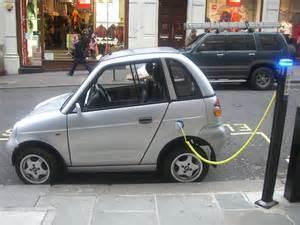
Plug in, pay a fee!
States look to tax hybrid and electric car owners to recoup road funding
Fox News: North Carolina is joining a growing number of states exploring new fees for hybrid and electric car owners to help make up for revenue those drivers aren’t paying in gas taxes on their fuel-efficient vehicles.
The proposal strikes many owners of alternative-fuel vehicles and some advocacy groups as a wrong-headed approach to balancing priorities of promoting U.S. energy independence with sustainable infrastructure funding. But policymakers and some experts argue taxing hybrid and electric vehicle owners is a matter of making sure all drivers help maintain the roads they use and construct new ones.
Gas taxes are the most vital source of transportation funding, making up nearly 40 percent of all state highway revenues and more than 90 percent at the federal level, according to the National Conference of State Legislatures. But those revenues haven’t kept up with rising construction costs, falling 41 percent in real value at the federal level since they were last increased 18 years ago, according to the Institute on Taxation and Economic Policy. The same non-partisan research group estimates that state and local gas-tax revenue fell 7 percent to $38 billion between 2004 and 2010.
Many transportation organizations and other groups say an overhaul that moves the system to a tax based on miles traveled is needed, but those reforms come with their own hurdles and for now states are looking for other fixes. At least 10 states are considering or have passed legislation to collect fees from owners of electric or hybrid cars.
“I think so far what we’re seeing is the trend seems to be either an additional annual fee or some type of registration fee seems to be much more popular than the miles-driven tax, because that is a newer technology and raises some privacy concerns,” said Kristy Hartman, a transportation and environment analyst at the NCSL.
New Jersey scrapped a plan to charge vehicles by miles traveled amid pushback from media and legislators, opting instead for a flat fee on electric cars.

North Carolina senators included an additional $100 annual registration fee for electric-car owners and a $50 fee for hybrid drivers. They estimate the new fees will raise $1.5 million annually. The Senate’s provision would have to survive budget negotiations with the House, which is expected to release its full spending plan in the coming days.
Sen. Neal Hunt, R-Wake and a chief budget-writer, argues the policy ensures all drivers are contributing their fair share toward maintaining the roads and services they all use. “I just seems logical to me that they should pay a small fee for the use of the highways and the wear and tear they put on the highways,” he said.
But that policy, along with the end of a pilot program offering four interstate plug-in stops, is troubling to many drivers of fuel-efficient cars. Ryan Turner, an IT professional in Chapel Hill, said he and many other drivers of alternative-fuel vehicles chose their cars because they’re concerned about the environment and the country’s dependence on oil. The Chevrolet Volt driver helped advocate for a statewide plug-in vehicle readiness plan.
“On its face, it’s reasonable for electric owners to contribute toward road tax in some way,” he said. “I think what’s suspect is that, given all the issues we have in this state, given the state’s woeful effort so far to promote electric vehicles as part of some statewide agenda, it is suspect that this vehicle tax is a priority given the small amount of the revenue it will bring in.”
The policy looks especially arbitrary when more and more conventional cars are achieving fuel efficiency that’s comparable to some hybrid cars, Turner added.
Jay Friedland, legislative director for the advocacy group Plug In America, has asked legislators in other states to phase in special fees after the number of alternative-fuel vehicles reaches 100,000, arguing administrative costs make such policies counter-productive before states reach a critical mass.
“We generally say this is a period of time when you should be incentivizing these vehicles, but after a while, yes, everyone should be paying their fair share,” he said.
North Carolina has an estimated 30,000 hybrid and electric cars registered in the state.
Plug In America supports a vehicle-miles tax, and Friedland said his organization swayed Washington lawmakers to include a study of that policy in the state’s own bill targeting alternative-fuel vehicles.
“Fundamentally, the mechanism exists (for charging a miles-traveled tax), but I don’t know of any states that are currently doing that yet,” he said. “We’re really on the edge of this, because we’re for once actually watching fuel consumption going down, and that’s why we’re watching these taxes come up.”
Berry Jenkins of the Carolinas Association of General Contractors said bigger reforms are ultimately needed to address infrastructure in the long term. He’s part of a coalition of businesses and regional transit groups that endorses miles-traveled taxes. The problem, he said, are concerns that they system would require intrusive new technologies and that fuels apprehension among political leaders.
“It’s never going to be a convenient time to ask people to pay more for infrastructure,” he said.
Going green has consequences.
DCG

